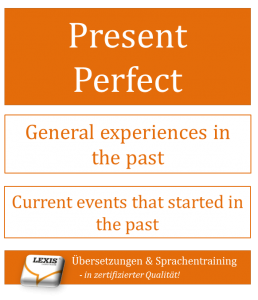Use (Verwendung)

We use the present perfect with for and since to talk about an event which started in the past and still continues. It connects a time in the past with the present.
Wir gebrauchen das Present Perfect mit for und since um über Ereignisse zu sprechen, die in der Vergangeheit angefangen haben und bis heute andauern. Es verbindet eine Zeit in der Vergangeheit mit der Gegenwart.
Form
We form the present perfect with the verb to have and the past participle of the main verb.
since – used with a definite point in time, e.g. since 2003
for – used to talk about a duration, e.g. for 2 years
Das Present Perfect wird mit dem Verb to have und dem Partizip Perfekt des Hauptverbs gebildet.
since – wird benutzt, wenn man sich auf einen bestimmten Zeitpunkt in der Vergangenheit bezieht: Jahreszahl, Monat, Tag, Datum, Ereignis usw.,, z.B. since 2009 (“seit 2003”).
for – wird benutzt, wenn man sich auf einen Zeitraum bezieht, z.B. for 2 years (“zwei Jahre lang”).
Irregular verbs (Unregelmäßige Verben)
Positive Sentences (bejahte Sätze)
I have worked at 24 Quick Logistics since 2003.
He has lived in Berlin for five years.
They have known each other since 1999.
Negative Sentences (verneinte Sätze)
Negatives are formed with not.
Verneinungen werden mit not gebildet.
I have not worked at Quick Logistics since 2003.
He has not lived in Berlin for five years.
They have not known each other since 1999.
Questions (Fragen)
Questions normally begin with the question words:
How long …?
Since when …?
and by inverting the subject and verb to have.
Fragen beginnen normalerweise mit Fragewörtern:
How long…? (“Wie lange…?”)
– z.B. “How long have you known him?” – “Wie lange kennst du ihn (schon)?”
Since when…? (“Seit wann…?”)
Fragen werden durch Umstellung des Subjekts und des Verbs to have gebildet.
– z.B. “Since when have you been married?” – “Wie lange bist du (schon) verheiratet?”
Since when have you worked at Quick Logistics?
How long have you lived in Berlin?
How long have you known each other?
Short Form (Kurzform)
The following short forms are used in speech and informal writing:
Die folgenden Kurzformen werden im gesprochenen Englisch und in informellen Schreiben verwendet:
I have – I’ve
you have – you’ve
he has – he’s
she has – she’s
it has – it’s
we have – we’ve
you have – you’ve
they have – they’ve
The full form should be used in formal writing.
In förmlichen Schreiben sollte man die (vollständigen) Langformen benutzen.
Training-summary
0 of 14 questions completed
Questions:
- 1
- 2
- 3
- 4
- 5
- 6
- 7
- 8
- 9
- 10
- 11
- 12
- 13
- 14
Information
You have already completed the training before. Hence you can not start it again.
Training is loading…
You must sign in or sign up to start the training.
You must first complete the following:
Results
Results
0 of 14 questions answered correctly
Your time:
Time has elapsed
You have reached 0 of 0 point(s), (0)
Earned Point(s): 0 of 0, (0)
0 Essay(s) Pending (Possible Point(s): 0)
Categories
- Not categorized 0%
- 1
- 2
- 3
- 4
- 5
- 6
- 7
- 8
- 9
- 10
- 11
- 12
- 13
- 14
- Answered
- Review
-
Question 1 of 14
1. Question
Complete the verb table with the past past participle (Ergänzen Sie die Tabelle mit dem Partizip Perfekt )
e.g. fall – fallen
-
begin
break
choose
know
meet
pay
read
teach
understand
wear
Correct 10 / 10 PointsIncorrect / 10 Points -
-
Question 2 of 14
2. Question
Which sentence is correct? (Welcher Satz ist richtig?)
CorrectIncorrect -
Question 3 of 14
3. Question
Which sentence is correct? (Welcher Satz ist richtig?)
CorrectIncorrect -
Question 4 of 14
4. Question
Which sentence is correct? (Welcher Satz ist richtig?)
CorrectIncorrect -
Question 5 of 14
5. Question
Which sentence is correct? (Welcher Satz ist richtig?)
CorrectIncorrect -
Question 6 of 14
6. Question
Which sentence is correct? (Welcher Satz ist richtig?)
CorrectIncorrect -
Question 7 of 14
7. Question
Which sentence is correct? (Welcher Satz ist richtig?)
CorrectIncorrect -
Question 8 of 14
8. Question
Which sentence is correct? (Welcher Satz ist richtig?)
CorrectIncorrect -
Question 9 of 14
9. Question
Complete the sentence (Ergänzen Sie den Satz)
-
How long have you (kennen) John?
CorrectIncorrect -
-
Question 10 of 14
10. Question
Complete the sentence (Ergänzen Sie den Satz)
-
I have (kennen) John for 7 years
CorrectIncorrect -
-
Question 11 of 14
11. Question
Complete the sentence (Ergänzen Sie den Satz)
-
How long have you (sein) the sales manager?
CorrectIncorrect -
-
Question 12 of 14
12. Question
Complete the sentence (Ergänzen Sie den Satz)
-
I been the sales manager for 2 years
CorrectIncorrect -
-
Question 13 of 14
13. Question
Complete the sentence (Ergänzen Sie den Satz)
-
I have lived in London (seit) 3 years
CorrectIncorrect -
-
Question 14 of 14
14. Question
Complete the sentence (Ergänzen Sie den Satz)
-
I have worked at 24 Logistics (seit) 2004
CorrectIncorrect -
